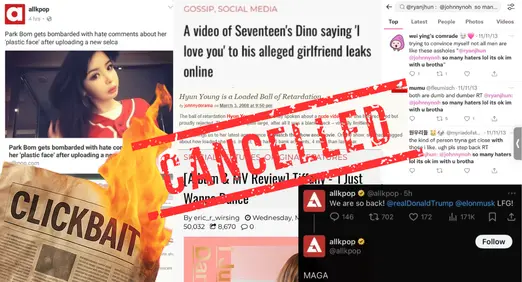
However, the same formula that fueled its early growth, fast reporting, constant content, and sensational headlines, also contributed to its decline. Readers increasingly criticized its coverage for mixing journalism with gossip. Headlines leaned toward clickbait, and the tone was often seen as crude or dismissive. Female idols were frequently objectified, male idols faced occasional homophobic comments, and articles often focused on idols’ physical appearances. What the site once called “edgy humor” was seen by many fans as outdated misogyny and insensitivity.
Why does everyone in r/kpop hate allkpop?
byu/purple_pentapus inkpophelp
Comment
byu/purple_pentapus from discussion
inkpophelp
8. they have posted hundreds of misleading/mistranslated headlines with the sole purpose of generating clicks at the idols’ expense pic.twitter.com/Nb2R0fttD9
— val (@qweenbeeval) January 22, 2025
there are speculations regarding whether or not they could have been hacked, however this is far from the first time that the admins are receiving backlash for being extremely unprofessional. for example, the tweet from the screenshot below is still up pic.twitter.com/IfDbVayPk9
— val (@qweenbeeval) January 22, 2025
The site’s most infamous scandal occurred in 2013 with the publication of pre-debut photos of singer Ailee. The images, taken years earlier under pressure from a fraudulent modeling agency, were uploaded with the site’s watermark. Reports revealed that Ailee’s ex-boyfriend, who was connected to the company, circulated the material before it appeared online. The backlash was immediate. Fans organized petitions calling for accountability and mainstream outlets condemned the decision to publish the images. Although the site continued operating, its reputation never fully recovered from the controversy.
The Ailee incident reflected deeper systemic issues rather than being an isolated case. Over the years, the platform faced repeated accusations from fans for invasive reporting, spreading unverified rumors, and using sensational framing. Even during quieter times without major scandals, critics often found its coverage out of touch with the international fan community.

After the site peaked, founder Johnny Noh and his associates pursued other ventures, including technology startups. Most of these efforts, however, struggled to gain traction. Eventually, Noh moved into more traditional sectors like real estate and construction, with companies like Beyder & Co. prominently featured on social media. This shift highlighted a broader decline, once a key figure in English-language Kpop media, Noh is now mainly linked to property development, not entertainment reporting.
Despite these leadership changes, the site kept publishing. For years, it benefited from being one of the few major English-language platforms consistently covering Kpop. Even fans critical of its tone often returned out of necessity during comeback seasons, when reliable translations and fast updates were hard to find.
Today, however, the biggest challenge the site faces is not scandal but irrelevance. Search results for terms like “Taehyung news” or “Jungkook update” are increasingly dominated by aggregator blogs, many run from outside Korea.

These outlets, often based in India, publish keyword-heavy articles focusing more on search engine optimization than on quality. Errors are common, for example, a recent headline referred to the “global pap” instead of “global map.” Yet, despite lacking community engagement or original reporting, these blogs often outrank more established sites in Google results.

Industry observers note the change in Google’s ranking system, which emphasizes “EEAT” principles (Experience, Expertise, Authoritativeness, and Trustworthiness). However, SEO-driven content farms exploit the system more effectively than traditional outlets. As a result, despite having no direct ties to Kpop fandoms, concerts, or artists, generic aggregator blogs now take top spots in search results.
Kpop SEO farms? The industry is wilder than we thought…Here’s what’s really going on⬇️#KPOP #kpoptwt
Read more: https://t.co/p3cuZ154qk— kpopping (@kpoppingcom) August 12, 2025
For the once-dominant tabloid, this marks a dramatic reversal. It rose to prominence by prioritizing speed and sensationalism but now faces competitors who operate with even fewer barriers and lower costs. Having thrived on volume rather than depth, it is now being outpaced by cheaper and faster alternatives that replicate its model without building a recognizable brand.
For longtime fans, the trend is clear. Years of criticism over tone, style, and controversies such as the Ailee photos tarnished the site’s reputation. Today, its decline is quieter but no less significant, a slide into irrelevance, driven not by boycotts or lawsuits but by the same digital mechanics it once exploited.
The site’s legacy may ultimately be defined less by its peak influence than by its long unraveling. Once seen as the gatekeeper of English-language Kpop coverage, it is now overshadowed by the very clickbait ecosystem it helped create. For many in the fandom, its slow fade into obscurity serves as a cautionary reminder that no outlet built mostly on sensationalism can stay at the top forever.

